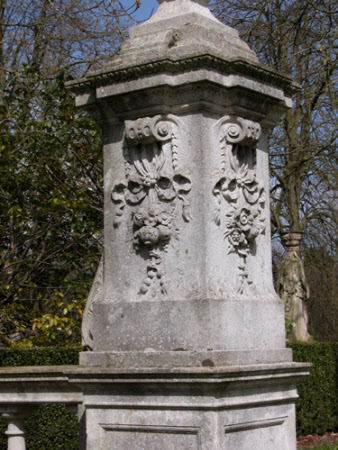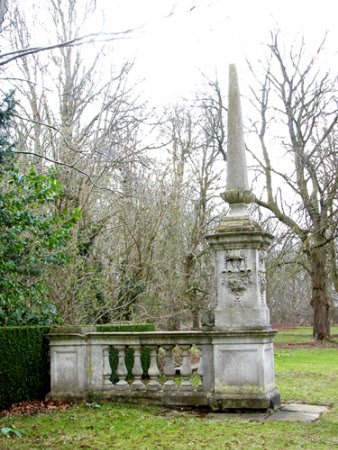A pair of obelisks and balustrades
Charles Eamer Kempe (Sussex 1837 - London 1907)
Category
Art / Sculpture
Date
1895 - 1896
Materials
Limestone
Measurements
20 ft (Height)
Place of origin
England
Order this imageCollection
Anglesey Abbey, Cambridgeshire
NT 516657
Summary
Limestone, a pair of obelisks with balustrades, designed by Charles Eamer Kempe (Brighton 1837– London 1907), 1895-6. A pair of four-sided obelisks in the Italianate style, richly moulded and with a motif on the pedestals incorporating volutes, ribbons, bellflower drops, and bunches of fruit, flowers and foliage. The balustrade side of the pedestals are enriched with corbels incorporating volutes and acanthus. Designed by Charles Eamer Kempe and installed in 1895-6 at Copped Hall, Essex. Removed from Copped Hall in c. 1950 by Bert Crowther of Syon Lodge.
Full description
Now installed on Chestnut Avenue in Anglesey Abbey, the obelisks and balustrades are in fact original to Copped Hall, Essex, where they were made for Ernest James Wythes, grandson of the railway magnate George Wythes who purchased the estate in 1869. After Ernest inherited in 1887 he engaged the designer Charles Eamer Kempe (1837-1907), who is better known for his stained glass, to extend and embellish the house and gardens. The obelisks were part of Kempe’s scheme for the terrace in the formal gardens and were photographed for a two-part feature published in Country Life (29 October 1910, p. 611). Copped Hall was gutted by fire in 1917 and the estate was sold in 1952. The obelisks, balustrading and three lead statues (NT 515135, 515159–515160) were purchased in c. 1950 by Bert Crowther, an architectural salvage dealer who frequently sold to Lord Fairhaven, and installed at Anglesey Abbey shortly after. In 1995 the Copped Hall Trust acquired the freehold of the house, ancillary buildings and gardens, all of which are gradually being restored to replicate original decorative schemes. Alice Rylance-Watson 2019
Provenance
Commissioned by Ernest James Wythes (1868-1949) for Copped Hall, Epping, Essex; purchased Bert Crowther, Syon Lodge c. 1950-2; purchased by Urban Huttleston Rogers Broughton, 1st Lord Fairhaven (1896-1966); bequeathed by Lord Fairhaven to the National Trust by with the house and the rest of the contents.
Credit line
Anglesey Abbey, The Fairhaven Collection (The National Trust)
Makers and roles
Charles Eamer Kempe (Sussex 1837 - London 1907), designer
References
'Country Homes, Gardens, Old & New, Copped Hall. - I. Essex, The Seat of Mr. E. J. Wythes', Country Life, October 29, 1910, pp. 610-7., p. 611. Roper 1964: Lanning Roper, The Gardens of Anglesey Abbey, Cambridgeshire. The Home of Lord Fairhaven, London 1964, p. 47, pl. 26. Christie, Manson & Woods 1971: The National Trust, Anglesey Abbey, Cambridge. Inventory: Furniture, Textiles, Porcelain, Bronzes, Sculpture and Garden Ornaments’, 1971, p. 171.


